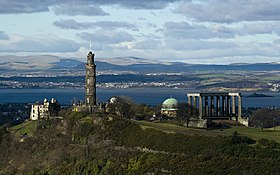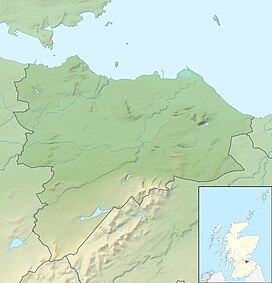Calton Hill, Edinburgh
| Calton Hill | |
|---|---|
| Caltoun, Caldoun | |

A view of Calton Hill with some of its many monuments taken from the Salisbury Crags
|
|
| Highest point | |
| Elevation | 103 m (338 ft) |
| Prominence | 46 m (151 ft) |
| Coordinates | 55°57′19″N 03°10′56″W / 55.95528°N 3.18222°WCoordinates: 55°57′19″N 03°10′56″W / 55.95528°N 3.18222°W |
| Geography | |
Calton Hill (/ˈkɔːltən/) (also referred to as "the Calton Hill"), is a hill in central Edinburgh, Scotland, situated beyond the east end of Princes Street and included in the city's UNESCO World Heritage Site. Views of, and from, the hill are often used in photographs and paintings of the city.
Calton Hill is the headquarters of the Scottish Government, which is based at St Andrew's House, on the steep southern slope of the hill; with the Scottish Parliament Building, and other notable buildings, for example Holyrood Palace, lying near the foot of the hill. The hill is also the location of several iconic monuments and buildings: the National Monument, the Nelson Monument, the Dugald Stewart Monument, the old Royal High School, the Robert Burns Monument, the Political Martyrs' Monument and the City Observatory.
In 1456, James II granted land to Edinburgh by charter wherein Calton Hill is referred to as "Cragingalt", the name by which it appears on the 1560 Petworth map of the Siege of Leith (rendered as "Cragge Ingalt"). The name may have derived from Old Welsh or Old English meaning "the place of the groves".
...
Wikipedia

